
The 1984 United States presidential election was the 50th quadrennial presidential election held on Tuesday, November 6, 1984. Incumbent Republican president Ronald Reagan was re-elected to a second term defeating Democratic former vice president Walter Mondale in a landslide victory.
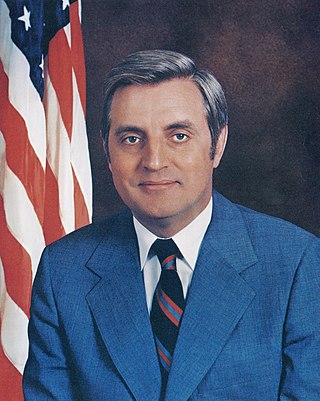
Walter Frederick "Fritz" Mondale was an American lawyer and politician who served as the 42nd vice president of the United States from 1977 to 1981 under President Jimmy Carter. A U.S. senator from Minnesota from 1964 to 1976, he was the Democratic Party's nominee in the 1984 presidential election, but lost to incumbent Ronald Reagan in an Electoral College and popular vote landslide.

Gary Warren Hart is an American politician, diplomat, and lawyer. He was the front-runner for the 1988 Democratic presidential nomination until he dropped out amid revelations of extramarital affairs. He represented Colorado in the United States Senate from 1975 to 1987.

Geraldine Anne Ferraro was an American politician, diplomat, and attorney. She served in the United States House of Representatives from 1979 to 1985, and was the Democratic Party's vice presidential nominee in the 1984 presidential election, running alongside Walter Mondale; this made her the first female vice-presidential nominee representing a major American political party. She was also a journalist, author, and businesswoman.

The 1984 Democratic National Convention was held at the Moscone Center in San Francisco, California from July 16 to July 19, 1984, to select candidates for the 1984 United States presidential election. Former Vice President Walter Mondale was nominated for president and Representative Geraldine Ferraro of New York was nominated for vice president. Ferraro became the first woman to be nominated by either major party for the presidency or vice presidency. In another first, the 1984 Democratic Convention was chaired by the female governor of Kentucky, Martha Layne Collins. The Democratic National Committee Chairman at the time, Charles T. Manatt, led the convention.
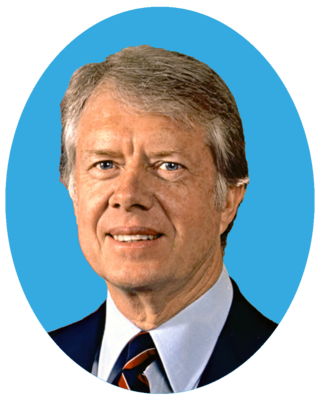
The 1980 Democratic National Convention nominated President Jimmy Carter and Vice President Walter Mondale for reelection. The convention was held in Madison Square Garden in New York City from August 11 to August 14, 1980.

Patrick Hayward Caddell was an American public opinion pollster and a political film consultant who served in the Carter administration. He worked for Democratic presidential candidates George McGovern in 1972, Jimmy Carter in 1976 and 1980, Gary Hart in 1984 (primary), Walter Mondale in 1984, Joe Biden in 1988, and Jerry Brown in 1992. He also worked for Mario Cuomo, Bob Graham, Michael Dukakis, Paul Simon, Ted Kennedy, Harold Washington, Andrew Romanoff and Donald Trump.
John Anthony Zaccaro is an American real estate developer and owner of P. Zaccaro & Company, which was founded by his father Philip Zaccaro. The company acts as a landlord for properties in the Little Italy, Chinatown, and East Side areas of Manhattan and previously in Queens.
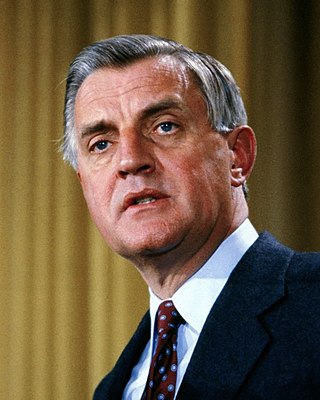
From February 20 to June 12, 1984, voters of the Democratic Party chose its nominee for president in the 1984 United States presidential election. Former Vice President Walter Mondale was selected as the nominee through a series of primary elections and caucuses culminating in the 1984 Democratic National Convention held from July 16 to July 19, 1984, in San Francisco, California.
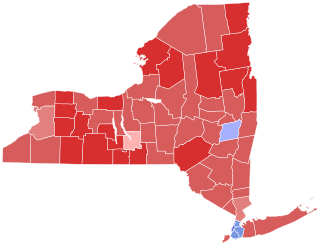
The 1986 United States Senate election in New York took place on November 4, 1986, alongside other elections to the United States Senate in other states as well as elections to the United States House of Representatives and various state and local elections.

The 1984 United States elections were held on November 6, and elected the members of the 99th United States Congress. Republicans won a landslide victory in the presidential election, picked up seats in the House of Representatives, and successfully defended their Senate majority.

The 1984 United States presidential election in New Hampshire took place on November 6, 1984, as part of the 1984 United States presidential election, which was held throughout all 50 states and D.C. Voters chose four representatives, or electors to the Electoral College, who voted for president and vice president.

The 1984 United States presidential election in Massachusetts took place on November 6, 1984, as part of the 1984 United States presidential election, which was held throughout all 50 states and D.C. Voters chose 13 representatives, or electors to the Electoral College, who voted for president and vice president.

The 1984 United States presidential election in Hawaii took place on November 6, 1984. All 50 states and the District of Columbia, were part of the 1984 United States presidential election. Hawaii voters chose 4 electors to the Electoral College, which selected the president and vice president of the United States. Hawaii was won by incumbent United States President Ronald Reagan of California, who was running against former Vice President Walter Mondale of Minnesota. Reagan ran for a second time with former C.I.A. Director George H. W. Bush of Texas, and Mondale ran with Representative Geraldine Ferraro of New York, the first major female candidate for the vice presidency.

The 1984 United States presidential election in Idaho took place on November 6, 1984. All 50 states and the District of Columbia, were part of the 1984 United States presidential election. State voters chose four electors to the Electoral College, which selected the president and vice president of the United States. Idaho was won by incumbent United States President Ronald Reagan of California, who was running against former Vice President Walter Mondale of Minnesota. Reagan ran for a second time with incumbent Vice President and former C.I.A. Director George H. W. Bush of Texas, and Mondale ran with Representative Geraldine Ferraro of New York, the first major female candidate for the vice presidency.
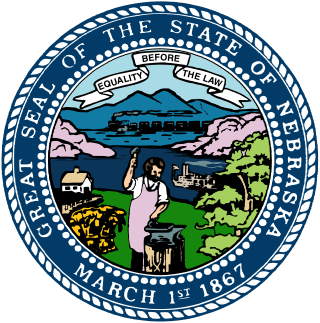
The 1984 United States presidential election in Nebraska took place on November 6, 1984. All 50 states and the District of Columbia, were part of the 1984 United States presidential election. Voters chose five electors to the Electoral College, which selected the president and vice president of the United States.

This article lists those who were potential candidates for the Democratic nomination for vice president of the United States in the 1984 election. Former Vice President Walter Mondale won the 1984 Democratic nomination for president of the United States, and chose New York Representative Geraldine Ferraro as his running mate. Ferraro was the first woman to be a part of a national ticket for a major party. Mondale chose Ferraro in hopes of energizing the base and winning the votes of women, but also because he viewed her as a solid legislator who had won the approval of Speaker Tip O'Neill. The Mondale–Ferraro ticket ultimately lost to the Reagan–Bush ticket. This is the last time the Democratic vice presidential nominee was not the incumbent vice president or a senator, and, not counting the times when the incumbent president was running for re-election, the last time the Democratic vice presidential nominee was not a senator.
The 1984 United States presidential election debates were held during the 1984 presidential election. Three debates were held between Republican candidate, incumbent president Ronald Reagan and Democratic vice president Walter Mondale under Jimmy Carter, the major candidates. One debate was held with their vice presidential running mates, incumbent vice president George H. W. Bush and congresswoman Geraldine Ferraro.

President Ronald Reagan authorized the formation of his 1984 reelection campaign committee, Reagan-Bush '84, on October 17, 1983. He made the formal announcement of his candidacy for re-election on January 29, 1984. On August 23, 1984, he secured the nomination of the Republican Party at its convention in Dallas, Texas. The convention nominated Vice President George H. W. Bush as his running mate.
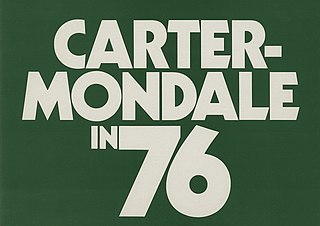
The 1976 presidential campaign of Jimmy Carter resulted in the election of Jimmy Carter and his running mate Walter Mondale as president and vice president of the United States, defeating incumbent Republican President Gerald Ford and his running mate Bob Dole. Carter, a Democrat and former governor of Georgia, launched his presidential bid in December 1974, as the Constitution of Georgia barred him from running for a second term as governor. In the wake of the Watergate scandal, the declining popularity of President Ford due to his pardon of Nixon, and the severe recession of 1974–75, many Democrats were sure of victory in the 1976 presidential election. As a result, 17 Democrats ran for their party's nomination in 1976. Carter's opponents mocked his candidacy by saying "Jimmy, who?", for his being relatively unknown outside Georgia. In response, Carter began saying "My name is Jimmy Carter, and I'm running for president." Carter extensively campaigned in the primaries, and in the end received 39.19% of his party's primary votes.




















